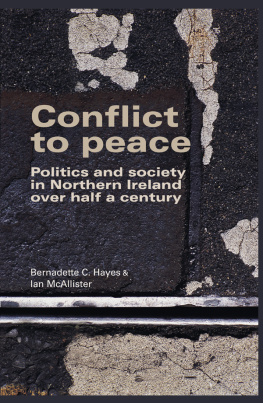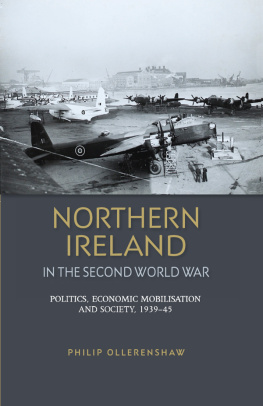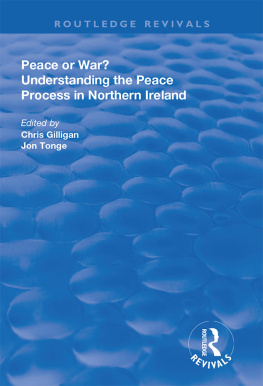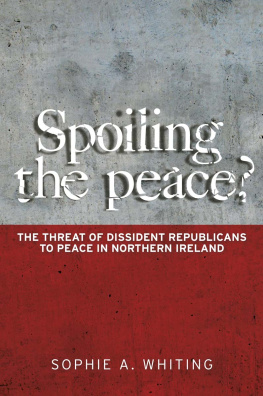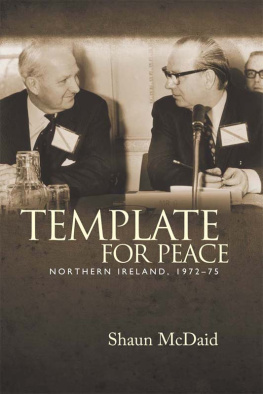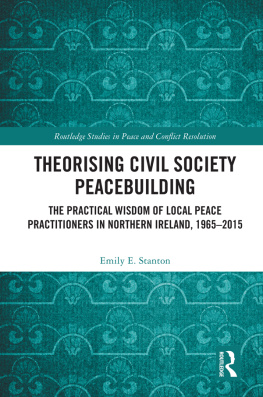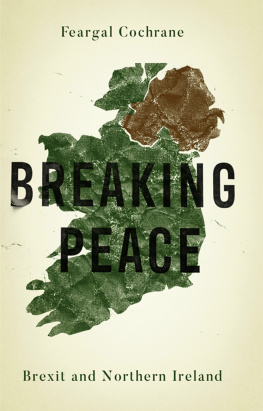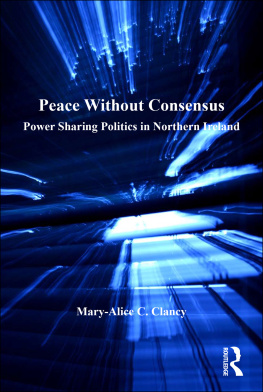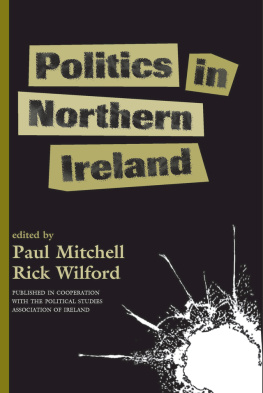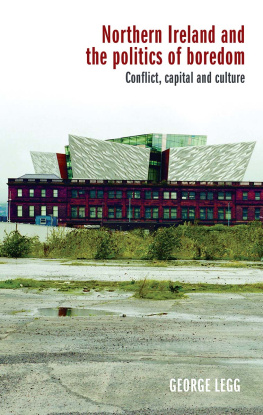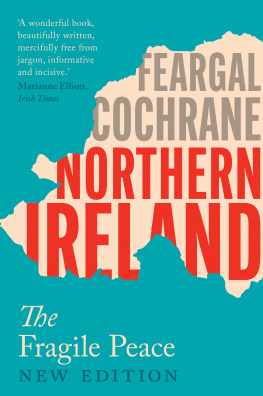Copyright Bernadette C. Hayes and Ian McAllister 2013
The rights of Bernadette C. Hayes and Ian McAllister to be identified as the authors of this work have been asserted by them in accordance with the Copyright, Designs and Patents Act 1988.
Published by Manchester University Press
Oxford Road, Manchester M13 9NR, UK
and Room 400, 175 Fifth Avenue, New York, NY 10010, USA
www.manchesteruniversitypress.co.uk
Distributed in the United States exclusively by
Palgrave Macmillan, 175 Fifth Avenue, New York,
NY 10010, USA
Distributed in Canada exclusively by
UBC Press, University of British Columbia, 2029 West Mall,
Vancouver, BC, Canada V6T 1Z2
British Library Cataloguing-in-Publication Data
A catalogue record for this book is available from the British Library
Library of Congress Cataloging-in-Publication Data applied for
ISBN 978 0 7190 7602 2 hardback
First published 2013
The publisher has no responsibility for the persistence or accuracy of URLs for any external or third-party internet websites referred to in this book, and does not guarantee that any content on such websites is, or will remain, accurate or appropriate.
Typeset by SPi Publisher Services, Pondicherry, India
Civil wars, or intrastate conflicts, have emerged as the most frequent and most deadly form of ethnic violence in the contemporary international system. As these conflicts have proliferated so too have international efforts to resolve them via peace agreements. The vast majority of these political settlements are based on power-sharing solutions in which the key antagonists to the conflict are guaranteed a place in government. Yet, in a growing number of cases, particularly since the 1990s, attempts to resolve these wars have led to the successful establishment of a lasting and peaceful settlement. For example, of the 122 intrastate armed conflicts that have occurred since 1989, Peter Wallensteen () has estimated that two-fifths involved peace agreements, the vast majority of which were successful.
It is now generally accepted that the peace accord which ended the Northern Ireland conflict the 1998 Belfast Agreement is an exemplar of this trend. As Martin McGuinness (), one of the key negotiators to the settlement and the current deputy first minister in Northern Ireland, put it: We are privileged that we are at the helm of one of the most successful peace processes in the world today. Indeed, since its ratification in 1998, a virtual cottage industry has emerged which seeks to export the Northern Ireland experience as a model for resolving ethnic conflict around the globe. Politicians, journalists as well as a range of academics have toured the world advocating the Northern Ireland peace process as a model for resolving ethnic conflict in violently divided societies. Much of the success of the Northern Ireland peace process has been attributed to the consociational nature of its power-sharing arrangements. Yet, not all political analysts are convinced as to the suitability of this approach. Some scholars argue that rather than resolving the conflict, consociational power-sharing arrangements further entrench and perpetuate ethnic divisions.
Using these differing interpretations as a starting point, this book focuses on the nature and extent of the Northern Ireland conflict as well as attitudes towards the political changes that have taken place since 1998. In doing so, we are fortunate in having a range of academic public opinion surveys stretching as far back as 1968, coinciding with the onset of the most recent phase of the conflict or what has become euphemistically known as the Troubles. These surveys enable us to explain and understand the motivations of the main perpetrators and bearers of the brunt of the conflict the Northern Ireland people themselves. Since the 1980s, at least one academic survey has been fielded in Northern Ireland each year, sometimes containing as many as 200 or 300 separate questions. The net result is that we possess a huge cumulative database on what the adult population thinks, how they behave, details of their past experiences and information about their hopes, aspirations and predictions for the future of their society. This is a resource that few medium-size countries possess, but it is unique to a region with a population of just under 1.8 million people.
While these opinion surveys have been quoted extensively in books and articles, there has been no systematic attempt to analyse them in order to provide a new perspective on Northern Ireland politics and society. Using the surveys, we extend existing research on Northern Ireland society and politics in two important ways. First, by examining the trends in responses to the same questions repeated in successive surveys, we can determine how much change has taken place and identify the causes of that change. Since there is still considerable disagreement on what lies at the heart of the Northern Ireland conflict, this provides an unrivalled perspective on that debate. Second, by pooling the surveys conducted since 1989, we can generate a very large sample size. This enables us to analyse small groups within the population which would otherwise have too few respondents for any statistically reliable analysis.
Any analysis based on survey research has obvious limitations, particularly when it is applied to a bitter civil conflict. One limitation is the tendency to under-report public support for controversial groups, an example being the significant underestimation of electoral support for Sinn Fein in the surveys. Survey respondents are also often hesitant in indicating their support for controversial policies. Nevertheless, while these are serious limitations, we argue that the surveys represent the most important method available to document and gauge changes in public opinion among the Northern Ireland population over an extended period. Empirical evidence, even with caveats, will always trump informed speculation.
This book makes use of these academic opinion surveys to examine, for the first time, the changes that have taken place in behaviour and attitudes in Northern Ireland over almost half a century. This is a period that coincides with the start of the most recent conflict in 1968 and covers all of the momentous events that have taken place since. These include the establishment of the 1974 power-sharing executive and its collapse just five months later in the face of a loyalist general strike; the 198081 hunger strikes when 10 republican prisoners died; the 1998 Belfast Agreement and the effective cessation of violence; and the establishment in 2007 of a power-sharing government dominated by the Democratic Unionist Party and Sinn Fein. These were all momentous events, and the surveys enable us to chart their impact on the population in detail.
Our analysis of this wealth of opinion poll data leads us to one simple conclusion. We argue that the previous intractability of the Northern Ireland conflict and the current problems in establishing a genuine peace stem not from one single division within the society but from a series of reinforcing divisions which encompass politics, social relations and the economy. Any one of these : 139) to comment in the middle of the first full decade of the conflict that it was an insoluble problem. His conclusion has proved to be too pessimistic, but it still took more than 20 years after his comment to halt the physical violence and reach even a basic accommodation between the parties to the conflict.


